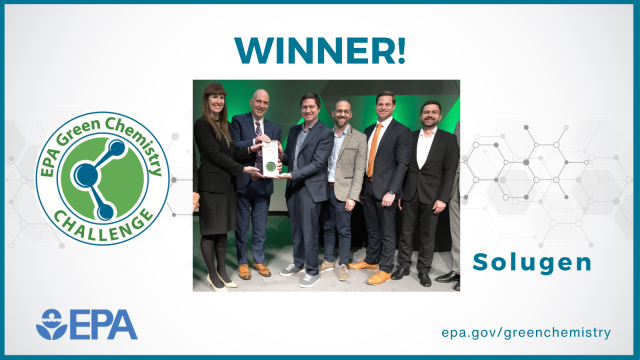Green Chemistry Challenge: 2023 Greener Synthetic Pathways Award
Solugen

Decarbonizing the Physical World
Solugen is being recognized for developing the Bioforge™, a unique manufacturing platform that uses a chemical process to convert plant-derived substances into essential materials that have historically been made from fossil fuels—all without emissions or waste. A highly scalable and localized alternative to conventional chemical manufacturing processes, the Bioforge™ can produce a range of high-performance, cost-competitive, and sustainable solutions to meet the diverse needs of a wide range of markets including water treatment applications and detergents. An independent life cycle analysis indicates that this first-of-a-kind manufacturing platform eliminates over 20,000,000 lbs of hazardous chemicals and mitigates over 35,000 tpy of CO2 equivalences (CO2e) compared to traditional facilities.
Summary of Technology:
Meeting the environmental goals of a clean chemistry future requires developing efficient technologies to convert molecules derived from renewable feedstocks and renewable energy into useful products. Current methods of producing bio-based chemicals rely on fermentation processes or heterogenous metal catalysis, which both suffer from wasted feedstock due to carbon yield losses and require complex, energy-intensive downstream processing.
To tackle this fundamental issue facing the chemical industry, Solugen has pioneered Bioforge™, a cell-free chemoenzymatic manufacturing process comprising a series of three primary operations: a cell-free enzymatic reactor, a metal reactor, and an evaporator. This first-of-its-kind platform combines the process safety and complex synthesis capabilities of fermentative routes with the high productivity, selectivity, and pH tolerance of gold catalysts.
Solugen decouples enzyme production from enzyme reactions, allowing enzymes to operate at a range of temperatures, at neutral pH, and with more productivity than fermentation, where conditions are limited by the requirements of living microbes. The gold nanoparticle catalysis developed by Solugen provides more than 90 percent carbon yield and selectivity.
For the final evaporation step, Solugen replaced the traditional natural gas-powered steam evaporator with mechanical vapor recompression technology, which is powered exclusively by wind energy. This chemoenzymatic process is now being used to produce a variety of different chemicals; compared to incumbent technologies, this production method has greater yield from the glucose feedstock, releases less CO2, and eliminates wastewater.
Note: Disclaimer
Return to the list of all winners including the 2023 Award Winners.
